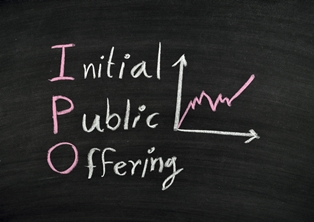As of March 4, 61 companies have filed for initial public offerings (IPOs) in 2014, leaving many investors wanting to know how to invest in IPOs.
What makes initial public offerings intriguing is how they can bring huge first-day gains to shareholders.
On Jan. 29, Dicerna Pharmaceuticals Inc. (Nasdaq: DRNA) went public and treated shareholders to a gain of almost 207% on the first day alone. Ultragenyx Pharmaceutical Inc. (Nasdaq: RARE) and Varonis Systems Inc. (Nasdaq: VRNS) brought in first-day gains of 101% and 100%, respectively.
Unfortunately, it's very difficult for the common investor to bring home those triple-digit gains.

"I often refer to the IPO market as the 'rich-man's market,'" Money Morning's Defense & Tech Specialist Michael Robinson told Money Morning's Executive Editor Bill Patalon. "And it's reprehensible that the gains are reserved for the rich."
In fact, unless you're a Wall Street insider or a very wealthy investor, investing in IPOs can be almost impossible...
The Difficulties of IPO Investing
When a company decides to go public, one of the first things it does is hire an investment bank to "underwrite" the financial filings required by the Securities and Exchange Commission (SEC).
From there, the IPO filing process is arduous.
The company and underwriter determine how much money will be raised, file registration documents, identify any legal issues, determine the IPO date, and decide on the share price. The process takes months to complete, leaving the company time to hype up the stock and excite potential investors.
As the IPO date approaches, the underwriter will begin selling the shares of the stock for the company.
That's where the common or "retail" investor comes into play, right? Not exactly.
The investment banks that perform the underwriting are typically large firms like JPMorgan Chase & Co. (NYSE: JPM), Goldman Sachs & Co. (NYSE: GS), or Merrill Lynch, to name a few. When it comes time to sell shares of the newly public company, these firms will typically sell shares to their favorite institutional clients.
Since so many companies will want a huge investment firm performing their underwriting, the banks can be choosy about which companies to underwrite. They'll pick the companies they think will have the most successful IPOs. In turn, they reward their favorite clients with shares of the hot new IPO they've just underwritten.
Additionally, firms will want to sell large chunks of their shares to very wealthy investors rather than selling smaller amounts of shares to thousands of retail investors. They want investors who can buy in bulk.
And the little guy is left watching...
"As I often tell people, because Wall Street tends to reserve the hottest issues for its 'best' customers - folks I often describe as the 'ultimate insiders' of the U.S. financial markets - IPO deals can be tough for retail investors to get into," Robinson said. "And even if you do manage to get a few shares, there are still difficult decisions to make - such as how long you should hold on, or under what circumstances you should sell."
In an attempt to capture some of those huge IPO profits, retail investors will often wait until a company goes public to buy shares... But that can an extremely risky strategy.
IPO Investing Pitfalls
Investors see companies that post triple-digit gains on their first day of trading and figure if they jump in right when the stock goes public, they'll still capture most of those profits.
However, when a stock opens up 100% higher than the initial set share price, that's where the retail investor is buying in. Those who just bought in are missing out on the 100% gains the wealthy IPO investor already banked.
Now, if the stock pares its gains and finishes its first day of trading up 50%, the retail investor has then lost 50% of the original investment.
Those "ultimate insiders" who were in before the stock went public are left celebrating a 50% gain in the first day.
Another challenge for the retail investor is finding the right IPO to invest in. Companies going public will naturally promote the best parts of their businesses, and bury the less desirable information.
To someone without a deep knowledge of the company, most IPOs will look compelling, even when they're not. That leaves many retail investors striking out on IPOs they thought were home runs.
While IPOs pose numerous risks to retail investors, there are still ways to profit from the IPO market...
Using IPO ETFs to Your Advantage
IPO ETFs like the First Trust IPOX-100 Index Fund (NYSE: FPX) and Renaissance IPO ETF (NYSE: IPO) are open to everyone and are great ways to play the IPO market.
They operate under different guidelines, but generally, each ETF buys a stock in the days following its initial public offering and holds it for a specified amount of time. This allows the investor to avoid any initial volatility and capture the profits from the stocks first few months or years.
Granted, one-day triple-digit gains are rare with these ETFs, but so too are major losses.
Learn more about how investing in the IPO market with IPO ETFs.
Do you invest in initial public offerings? Which type of IPOs do you typically keep an eye on? Let us know on Twitter @moneymorning using #IPOs.
This one quick trading technique will help you pocket more of the huge gains you've made, and even opens you up to major additional gains...


